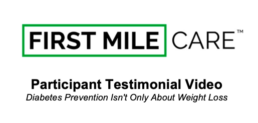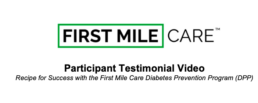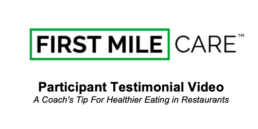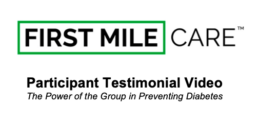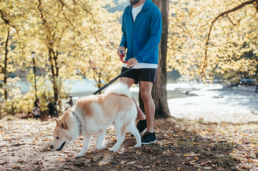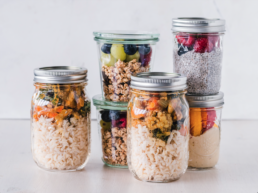By Juliana Ronn, First Mile Care Director of Operations
Roberta Varnado is a 64-year-old retired purchasing administrator who lives with her husband in Cypress, Texas, just northwest of Houston. She completed the year-long First Mile Care Diabetes Prevention Program (DPP) in October 2021.
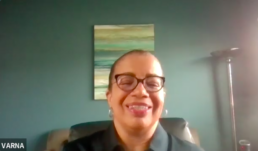
- Roberta, were you surprised when your doctor invited you to join the First Mile Care DPP?
No, I wasn’t really surprised when I got the letter from my doctor — Lesly Dessiuex of Bridge Creek Family Medicine in Cypress — suggesting that I join the First Mile Care program. I was already aware that I had prediabetes. A few years ago, before moving to Texas, my doctor in Colorado told me that my A1C level was too high — it was 6.0. I was shocked and a little angry when I first got the diagnosis, as I wasn’t overweight and I have always exercised regularly. High blood pressure and thyroid imbalance both run in my family and I know I’ll probably never stop medication for those conditions, but I really don’t want to take drugs to address prediabetes as well.
My doctor started me on medication and I attended a one-day class to learn more about living with prediabetes. I was determined that I would get off the medication and thought I could address it on my own. We moved to Texas and I retired, so my lifestyle changed, but my A1C kept going up. At one point, it hit 6.5. I finally realized my problem wasn’t weight or lack of exercise, it was my diet. I was addicted to sugar, and I just couldn’t change my eating habits to address it. So when my doctor suggested I join the First Mile Care DPP, I immediately signed up. I thought their coaching might help me to make lasting changes.
- First Mile Care encourages participants to determine their own individual goals for the program. What was your goal?
As I said, weight has never been an issue for me, so losing weight wasn’t really a goal. If it happened, great, but it wasn’t my problem. My reason for joining the program was to control the sugar in my blood and reduce my A1C by natural methods. I do not want to develop diabetes, but I also don’t want to be on medication for it the rest of my life. I needed to address my sugar cravings and learn portion control.
- The program offers 22 sessions over the course of a year. What results have you seen?
When I started the First Mile Care program in October 2020, my A1C was at 6.2. By the time I finished the program a year later, it was down to 5.8. Doctor Dessiuex has told me that I can move off the medication when it hits 5.7 or below, so I’m aiming for that.
I also lost 10 pounds while in the program, and have kept that off. I was glad to lose it, even though I wasn’t really overweight. I’m sure it helps with my blood pressure, though.
- Has changing your diet been hard for you?
In the beginning, I struggled a bit with sugar cravings. I just l-o-v-e my sweets. The First Mile Care program has been really helpful in teaching me how to adjust my diet and portions. I needed guidance as to what foods and drinks are high in sugar and carbohydrates and what can serve as satisfying substitutes. My coach, Robert McNeill, taught me how to pay attention to food labels to notice the grams and ounces of sugar, salts, carbs, and fats, and also servings and portion sizes. And other people in my class suggested things I could try in place of the baked goods and high-sugar juices I normally consumed. I used a food diary for a couple of weeks, as required in the class. It was interesting to see patterns, although I have since given it up as I have become more mindful of my eating habits.
- How have you dealt with your sugar addiction? What kind of changes have you made to your food intake?
Now that I’m retired, I don’t have to eat to suit my work schedule, but have found that I am perfectly satisfied eating a late breakfast and early dinner. I eat smaller portions and choose something filling and satisfying. I used to eat pastries with my morning coffee, but now I find that I’m happy with something that has protein, like a whole egg or scrambled eggs, or avocado toast. I don’t miss my doughnuts. I usually don’t need a snack between meals, but if I do, I might make a fruit smoothie.
For me, success has really all been about learning to make substitutions. If I can find a good substitute for something I used to eat that was high in sugar, I’m happy. For example, I love to drink juice and eat fruit and used to assume that it had a lot less sugar than a pastry. I learned through First Mile Care to check the labels on juices for added sugars, and that not all fruit is equal. I’ve cut back on grapes and bananas and eat more strawberries, raspberries, blueberries, watermelon, and cantaloupe.
While I’ve never eaten a lot of chips and pretzels, one of my favorite snacks has always been popcorn. Now, instead of buying the prepared packets with their additives, I get plain popcorn to cook in a brown bag in the microwave and add a little real butter for flavor. I’ve also started to eat nuts more often now, as they are satisfying when I do have a craving for a snack.
- What did you discover in your First Mile Care class that surprised you?
In addition to paying attention to nutrition labels in the market, I learned a trick for when I go out to eat. Coach Robert explained that most restaurants will have their menus posted to their websites with information on calories, carbs, sugar, sodium, etc. I didn’t realize that it was possible to find that information so easily, so you can plan your meal in advance and be sure to choose the healthier options. Some of the people in my class dined out a lot, so we did an experiment in class one day and researched the online menus of a lot of local restaurants, and were able to find the nutritional information on most of the menus.
- First Mile Care emphasizes hyperlocal classes with participants from the same ZIP code, moderated by a coach with knowledge of the neighborhood. Did you find this helpful?
Oh yes, of course. It’s very motivating to hear other people share their struggles and successes. You want to have something to report in your class to earn encouragement from the other people. You don’t want to be the only one to say, “Oh, no, I didn’t work out this week.” You want to have some progress to discuss. We even had a challenge at one point to see who drank the most water in two weeks.
Coach Robert was very helpful and empathetic with our struggles. He offered suggestions from his own experience with healthy lifestyle change. He likes to eat out, as did most of the other people in the group, so they shared a lot of tips on getting healthy food at local restaurants and markets.
- You finished the First Mile Care program three months ago. How are you maintaining the progress you made in changing your lifestyle?
It’s been 15 months since I started the program, so the changes I’ve made do seem permanent. I don’t have the sugar cravings I used to have. If I need to, I’ll do a 28-day challenge or fast to break the cravings. I’m more mindful now of what I eat, how much, and when.
I continue my fitness routine of at least 30 minutes a day of exercise, which is more than the First Mile Care DPP minimum of 150 minutes a week. Walking has always been my exercise of choice. I like to walk outdoors, and of course I have to walk my dog daily. It can get so hot and humid in Texas in the summer that I started using a walking program video for exercising at home, and I also have an exercise bicycle in my home, too.
I know I have to be diligent to keep my A1C down. It’s very easy to slip up and have it start to increase. Now that I’m no longer in the First Mile Care class, I get support from my sister. We motivate each other. Thanks to what I learned in the First Mile Care program, I’m hoping that I will soon be able to stop the medication — and stay off it for good.
To learn more about how you can benefit from the First Mile Care Diabetes Prevention Program, take the prediabetes risk test and get started today!

